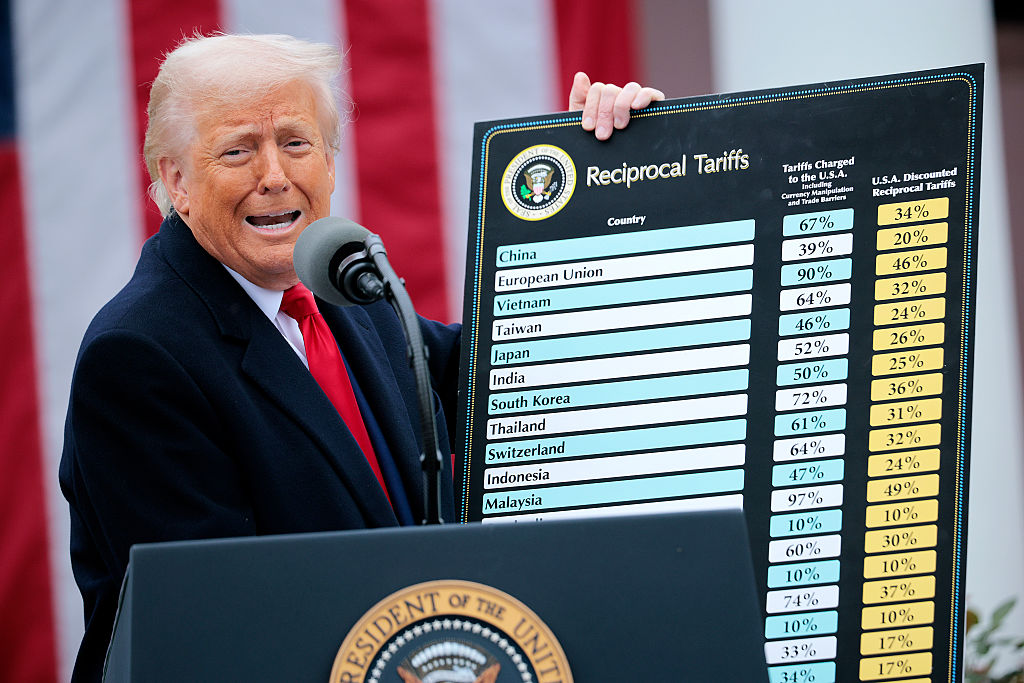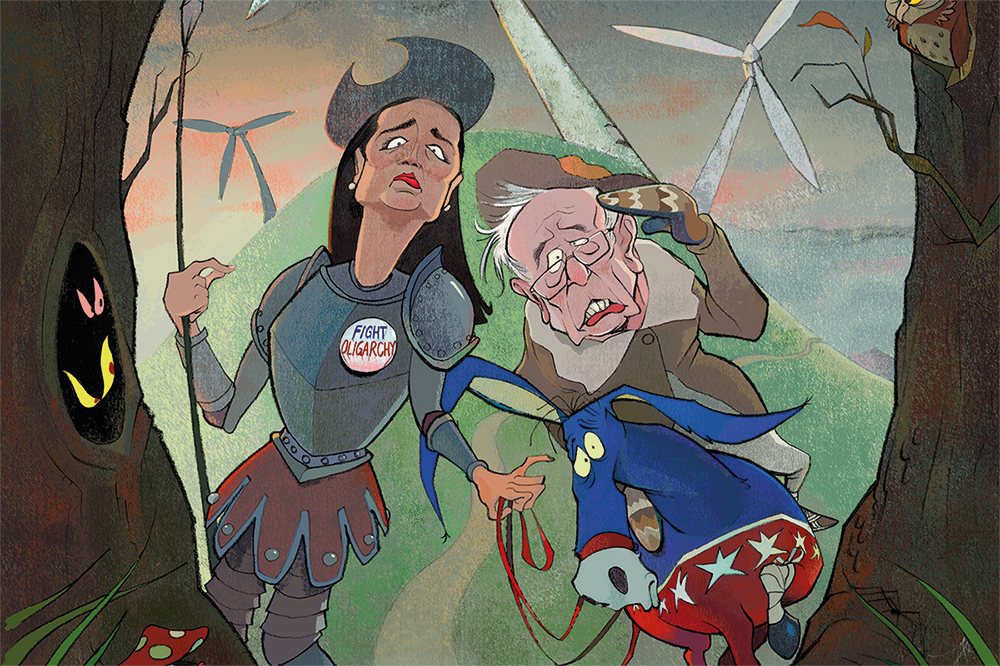When I was a younger man, I found myself on the receiving end of a good bit of unsolicited advice for surviving as a member of the right — tried and true lessons in how to stay interesting without getting canceled or killed. Read all the archives of the Weekly Standard. Avoid talk of Israel, IQ and the Glorious Revolution. Don’t drink too much. Don’t drink too little. Take up smoking. And, most importantly, don’t involve yourself with any organizations predicated on white identity.
I have never been very good at following sound advice, which is why I joined “White Dudes for Harris” on Monday.
The existence of such an affinity group is remarkable in itself. So much of the political theater of the last three generations has been driven by the insistence that white men, especially straight white men, are the one and only political constituency that can never be allowed to conceive of themselves as a discrete group with identifiable interests. That way lies fascism or, at the very least, cisnormative white Christian heteropatriarchy.
I did not expect a three-hour Zoom call to awaken my sense of racial solidarity. It was, admittedly, an impressive showing: nearly 200,000 virtual attendees racked up more than $4 million in small-dollar, blood-money donations. (Every so often, a cartoon rendition of the vice president in blue pantsuit pops up over the bar tracking contributions, lifting her arms robotically. A big gold star flashes behind her with giant script: KAMALA.) I had only been to one other rally this size before — and that one didn’t end too well.
The organizer is something of a surprise. The internet is awash with photos of a Democrat apparatchik named Ross Morales Rocketto, a great hulking mass of progressive energy, but he is not the man I see before me. Ozempic works miracles. The man bun is another story.
Morales Rocketto seems aware of the discomfort with which many will approach a whites-only boys’ club devoted to electing the first Jamaican-Indian female president. He laments the fact that “throughout American history, when white men have organized, it was often with pointy hats on.” He is evidently unaware that he is raising money for a descendant of slave owners.
Despite writing off their ancestors as the forces of (figurative) darkness, he makes his appeal to “the Silent Majority of white men [who] aren’t actually MAGA supporters.” He admits that “the way that our economy has changed over the years has left a lot of hardworking folks who are trying to do right by their families behind.” No longer can the average American man fill his natural role as provider and protector.
Who better to right these wrongs than Pete Buttigieg, that great cultural icon of white masculinity? Mayor Pete, like Harris a descendant of slave owners, sets the tone, exhorting the White Dudes for Harris to pass the torch to the New America. The revolution is not just for the girls. He explains: “Men are also more free in a country where we have a president who stands up for things like access to abortion care. Men are more free when the leader of the free world and leader of this country supports access to birth control and to IVF.” This is a surprisingly transparent moment, though Pete Buttigieg is not likely to share the motivations of most pro-choice males.
It is Tim Walz, the leftie governor of Minnesota, who addresses the opening concerns most directly. Walz is a retired sergeant major in the National Guard and the former congressional representative of a rural district Donald Trump won by fifteen points. More importantly, he is a Harris VP finalist; Democratic consultants are eager to balance the ticket with someone whose ancestors didn’t own slaves. Walz has yet to publicly disclose his Ancestry.com profile.
The forgotten, disillusioned white men who now anchor the Republican base are not necessarily evil racists all; most of them are simple dupes — and angry ones at that. The crisis these men face, says Walz, is the work of “robber barons” — not the corporate oligarchs who shipped their jobs to China, mind you, but the family down the street that voted for school vouchers. “One person’s socialism,” Walz reminds us, “is another person’s neighborliness.”
Only Jimmy Williams, a trade union president, dares to speak the language of retail politics. He touts among this administration’s great accomplishments “the American Rescue plan, which bailed out hundreds of thousands of workers’ pension plans — white dudes’ pension plans — [and] the bipartisan infrastructure bill that’s creating hundreds of thousands of construction jobs for white dudes, passed by this administration. And that’s just the scratch of the surface that we can do as a country.” (Just weeks ago, in the debate that killed the president, Democrats were insisting that they had no idea what the term “black jobs” could possibly mean.)
Roy Cooper, the term-limited governor of North Carolina, is livid that Donald Trump supports Mark Robinson, the black Republican lieutenant governor now running to replace him. Cooper, another descendant of slave owners, notes with disgust that Trump has referred to Robinson as “Martin Luther King times two.” (As a purely mathematical proposition, it is hard to argue with.) Cooper argues that white men must rally against the Robinsons of the world in order to elect Kamala Harris, who will “work for tax credits for children and the middle class.” (Just last week, we were warned that J.D. Vance’s support for exactly such tax credits is the first page in The Handmaid’s Tale.) Shortly before the Zoom call, Cooper had announced he would not pursue the vice presidency; it is easy to see why.
Comedian Paul Scheer gushes over a “$65 billion investment to expand high-speed internet across the US, which created hundreds of jobs.” (Can anyone do the math on that ROI?) Lest we mistake her for any kind of moderate the gap-toothed improv actor dives into the talking points: Kamala was “one of the earliest sponsors of the Green New Deal” and “the first vice president who has ever visited a Planned Parenthood.” She is “more qualified than pretty much any other candidate for president we’ve ever had.” In time, the narrative must be swallowed by the myth. Policy counts for naught if Kamala is not worshipped and believed as the great god-hero girlboss POC who will lead the next American Revolution.
Mitch Landrieu, her campaign co-chair, lays a foundation: “Kamala is carrying on her shoulders 248 years of pain, of agony, of hope, of frustration, and no matter how high she jumps, no matter how many degrees she has, no matter how good her grades are, she’s never good enough, because they’re always moving the line.” Despite being raised by two highly accomplished academics, the best she could muster for herself was undergrad at Howard and then UC-San Francisco for law school. Kamala failed the bar exam on her first attempt — putting her in the minority of her middling alma mater. And what pain, agony, hope or frustration Ms. Harris could retain from 1776 is hard to imagine given that no branch of her family tree touched American soil before 1958. I suppose things were rough in Madras in those days.
There is quite a bit of fiction in the worldview of these men. Among the headliners of the call is “somebody who understands what it means to be in the West Wing because he was actually in The West Wing” — television’s Bradley Whitford. Whitford has something like self-awareness. He muses: “What a variety of whiteness we have here. We got The Dude, we got Pete [Buttigieg]. It’s like a rainbow of beige.”
Hollywood has heavy representation. Adam Schiff shows off his Big Lebowski bobblehead, which feels a bit too clever to think he meant it as a joke. Josh Gad, who is introduced as the voice of snowman Olaf in the children’s cartoon Frozen, brags: “They have Kid Rock, Kevin Sorbo and a dolphin aficionado, and we have the Hulk, Samwise Gamgee, Luke Skywalker and Mayor Pete just on this Zoom.” The Hulk Hogan erasure is grotesque.
I am as fond of Samwise Gamgee as the next pipe-smoking twenty-five-year-old, but Samwise Gamgee is a fictional character. Sean Astin, meanwhile, is all too real. Astin has lately determined that “the mid-level bureaucrat” is the true hero of the American regime, and what we need is “a president that actually cares about these people.” An inspiring message to make Aragorn blush: government of the HR cat lady, by the HR cat lady, for the HR cat lady.
NYU marketing professor Scott Galloway, bald and slouching in a tattered gray hoodie, describes the Biden administration’s funding of the Ukraine war as “the greatest investment in the history of the modern economy.”
“I am—,” Galloway catches himself, “— I consider myself a man.”
Galloway offers a $50,000 matching contribution to the Harris campaign on the condition that Mark Hamill tells him “I’m Luke Skywalker. I’m here to rescue you.” Hamill obliges, though his raspy septuagenarian voice does not quite match his character from Star Wars.
Doug Jones, who is best known for losing a 2020 Senate election by more than twenty points as the incumbent, describes Hamill — who he refers to as Luke Skywalker — as “the man who saved the galaxy.” Jones gives voice to the suffering of at least one disgruntled white man: “I’m trying to stay within my time, even though very few people on the call have. That’s OK, I was a senator, I’m used to that kind of crap.” If it was meant as a joke, it does not land as one.
As hour three drags to a close, Morales Rocketto eagerly introduces “the hilarious and awesome Adam Conover.” In all of human history, there are precious few people I loathe more than Adam Conover; he is right up there with Hitler and Walter Cronkite. Among my least civilized habits is that I tend to fall asleep nightly to the background noise of the Impractical Jokers on truTV, which — until divine mercy amended the programming schedule — meant for many months that I would be woken up each morning by the insufferable sound of his short-lived program Adam Ruins Everything. The premise of the show is that Conover interrupts people going about their business to educate them with some far-left “well, ackshully” hokum about how the suburbs are evil and racist, that charitable giving and biology are right-wing conspiracies and we’ll all be underwater in five years.
The insufferable preachiness of his fictionalized self is, if anything, underplayed on screen. From other speakers there have been at least occasional admissions of sympathy with the men left behind by an economy and society now actively working against them. Conover, that connoisseur of contrarian nuance so long as its incorrect, discovers simplicity: “Fuck you, because that’s racist.” There is a full shelf of liquor behind him; as the rant rolls on, he starts to rub his nose.
He is followed by a man named Rory O’Malley who (we are told) was in the original Broadway cast of Book of Mormon. Here are the standard expressions and tics of the typical theater luvvie, each sentence landing like manicured nails on a chalkboard. He offers advice to those who struggle to pronounce the candidate’s name, exaggerated and divaesque: “MAD-am Prezz-ident.” The camera cuts back to Morales Rocketto, who has absorbed some of O’Malley’s Broadway mannerism: “Fuck, yasss.”
My Not Racist credentials stand unimpeached: if this is the White Man awakened, I will gladly keep my distance.


























Leave a Reply